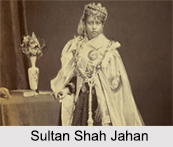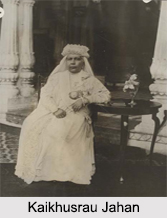 During British rule in India (which covers both the British East India Company rule and later the British Raj), the state of Bhopal was ruled by many people. Majority of the rulers of this state were male successors, but the state was also ruled by female successors. The male successors were called the Nawabs whereas the female successors were called Nawab Begums. Given below are the Nawab Begums of Bhopal.
During British rule in India (which covers both the British East India Company rule and later the British Raj), the state of Bhopal was ruled by many people. Majority of the rulers of this state were male successors, but the state was also ruled by female successors. The male successors were called the Nawabs whereas the female successors were called Nawab Begums. Given below are the Nawab Begums of Bhopal.
Qudsia Begum
Qudsia Begum served Bhopal from 1819 to 1837 as the first female ruler of the state.
Sultan Sikander Begum
Sultan Sikander Begum, the Nawab Begum of Bhopal ruled from 1860 to 1868.
Sultan Shah Jahan
Sultan Shah Jahan, the Nawab Begum of Bhopal ruled from 1844 to1860 and then from 1868 to 1901. As an effective ruler, Shah Jahan is credited with the improvement of tax revenue system, commissioning of the farming of opium to balance the budget deficit, increment of salaries of her soldiers, modernization of the military`s arms, improvement of the efficiency of the police force, construction of a dam and an artificial lake and the undertaking of the first census post two plagues in the state.  She had authored several books in Urdu and initiated the construction of one of the largest mosques in India, the Taj-ul-Masajid in Bhopal. Shah Jahan is also credited with the construction of the Taj Mahal Palace in Bhopal. Her generosity can be comprehended from the donations for the building of a mosque at Woking, Surrey in the UK. To establish the Muhammadan Anglo-Oriental College at Aligarh (which became the Aligarh Muslim University), Shah Jahan made contributions. She had also subsidized the cost of a railway to be constructed between Hoshangabad and Bhopal.
She had authored several books in Urdu and initiated the construction of one of the largest mosques in India, the Taj-ul-Masajid in Bhopal. Shah Jahan is also credited with the construction of the Taj Mahal Palace in Bhopal. Her generosity can be comprehended from the donations for the building of a mosque at Woking, Surrey in the UK. To establish the Muhammadan Anglo-Oriental College at Aligarh (which became the Aligarh Muslim University), Shah Jahan made contributions. She had also subsidized the cost of a railway to be constructed between Hoshangabad and Bhopal.
Kaikhusrau Jahan
Kaikhusrau Jahan was the Begum of Bhopal from 1901 to 1926. Kaikhusrau was a progressive ruler which can be comprehended from the fact that she founded several important educational institutions in Bhopal like technical institutes, established free and compulsory primary education in 1918 and increased the number of qualified teachers. She particularly focused upon public instruction, especially female education. She had reformed taxation, the army, police, the judiciary and the jails. She had expanded agriculture and carried out extensive irrigation and public works in the state. She is credited with the establishment of an Executive and Legislative State Council in 1922 and commencement of open elections for the municipalities. She is noted for inoculation and vaccination programs, improvement of water supply and standards of hygiene and sanitation. She has authored books on education, health, etc.






































